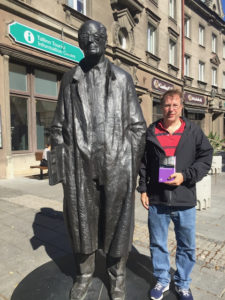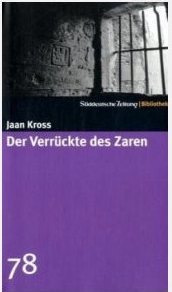The jacket copy from the Süddeutsche Zeitung edition of Jaan Kross’ historical novel The Tsar’s Madman, first published in 1978, is tough to beat for a concise summary. “In his diary, Jakob Mättik tells the dramatic story of his brother-in-law, the Baltic German nobleman Timotheus von Bock, who won not only renown in 1812 in the war against Napoleon but also the trust and friendship of Tsar Alexander I. Alexander wins a promise from Timotheus that he will always tell the Tsar the truth. Bock keeps his promise and presents the Tsar with a memorandum that mercilessly lays out the problems of the Russian Empire and does not hold back from criticizing the Tsar personally. … But his boldness is harshly punished: he is arrested and locked away. His pregnant wife Eeva, Jakob’s sister, is left behind. Nine years later, Bock is declared insane and released, but the new Tsar Nicholas I only allows Bock the life of house arrest on his estate with an overseer. Not only the overseer but also Jakob wonder whether Bock is just a dreamer, a rebel, or maybe an actual madman…”
Jakob’s diary moves back and forth in time, describing not only the novel’s present when Timotheus has returned, but also the time of his arrest and how everyone — most particularly Eeva — coped with the absence of the lord of the manor. He also relates times further past, when Timotheus first took an interest in Eeva (and Jakob by extension) and how they came to be married. As a German-speaking noble, Timotheus is part of a class that had dominated Estonia since the 1200s and 1300s. The Russian Empire was a comparative latecomer, having wrested the Baltic shores from Swedish control in the early 1700s. By the time of The Tsar’s Madman, Russian monarchs had reigned over the region for a bit more than a century. The nobles were integrated in Russia’s high society, and travel to the Imperial court in St. Petersburg was a regular part of their lives. They served in Russia’s armed forces and followed the capital’s fashions, but in truth Russian suzerainty had done little to change relations on the manors that had persisted for centuries. The nobles’ society that Kross shows is Baltic and German; the few Russians who appear are either passing through or are on a particular mission with orders from the court.
The Estonians have, of course, been there all along. It is their labor that props up the entire system of nobility and empire, but neither the local Germans nor the sovereign Russians think that they count for much. Jakob himself does not name the Estonian language, he just calls it “the peasants’ tongue.” Kross knows better, of course. He wrote the novel in Estonian, and his work led to a revival of historical fiction in Estonian in the late Soviet period. Kross was born in the interwar Republic of Estonia, and he finished his studies of law during World War II, when Estonia was alternately occupied by the Soviet Union and Nazi Germany. After the war, the Soviets deported him to Siberia, and he was held in the Gulag until 1954. When he returned, he found his law qualification was useless, as Soviet law had superseded Estonian, and Kross turned to writing to make a living. Historical subjects kept him clear of the worst of late Soviet censorship, and he became Estonia’s most-translated author. Kross outlived the Soviet Union, dying in 2007 in a Tallinn that was the capital of independent Estonia as it was when he was born.
Fundamentally, The Tsar’s Madman is an examination of how a morally upright person can live in an unjust system characterized by arbitrary authority. Timotheus pursues things to their logical conclusion, and pays a heavy price. Couldn’t he have laid low, mouthed pieties and gotten on with his life — or striven to get ahead in the system as he found it? That’s what most people did, after all. Much of the first half of the novel is Jakob piecing together what Timotheus did to get locked away. Which of the many rumors are true? Any of them? How much did his sister know, and whose side was she on? Was Timotheus really on a first-name basis with the Tsar? How did he fall from favor?
Jakob shows the other ways in which Timotheus stood out from the society he grew up in. First was the fundamental fact of his interest in Eeva, and the respect that he showed to her. It would have been a relatively simple matter for a man of his station to have had an illicit relationship with Eeva while marrying a social equal. That was not Timotheus’ way. He saw to it that not only Eeva but also her brother Jakob were educated as one of the upper class would be, learning not only German and Russian but also French, along with music, natural sciences and mathematics among other subjects. Kross never comes out and says so explicitly, but I was left wondering whether Eeva and Jakob weren’t something of a project for Timotheus. That’s par for the course for him. He clearly loves Eeva, but he remains self-contained and self-possessed enough that he might have started everything just to prove a point. After all, if someone will endure nine years of harsh imprisonment on principle, what else might he do for similar reasons?
The flip side of that, though, is the steadfast support that he shows for Eeva in the face of social ostracism after their marriage. The first time that they have the temerity to show up in the German church as man and wife, nearly all the ladies of the parish stand up and walk out, no small number trailing their husbands. The von Bocks receive a few visitors after their marriage, but the number dwindles swiftly, and even most of Timotheus’ relatives will not come and see them. The pressure to maintain ethnic and class lines was immense. Only someone with Timotheus’ rock-solid economic standing and immovable character could withstand it.
Though the book is framed as a criticism of the arbitrary power of monarchy — and I am sure that is how it must have been characterized to the censors — it can easily be read as a critique of the arbitrary power of the Soviet Union. Everything that the Tsars and their representatives are shown doing in the book, the Soviets did, and usually worse. During the Brezhnev era, when The Tsar’s Madman was first published, dissidents were often characterized as mentally ill and forced into psychiatric confinement for expressing anti-Soviet views. The reasoning that someone would have to be crazy to speak up against the way things were is precisely the reasoning that the Tsar and his minions used against Timotheus.
I find it difficult to believe that the censors and everyone involved with the novel’s publication in Soviet Estonia failed to see the parallels. Enough of them, it seems, were on the side of Estonia to let the novel be published and begin to win acclaim. The situation might have been parallel to the first overseer Imperial authorities send to von Bock’s estate after his release. Someone has to report, so it might as well be you, says Timotheus. Tell me what you want me to write, says the overseer. Most former prisoners would leap at the chance to keep their nose clean with the authorities, to collaborate with someone who is willing to do them the favor of ensuring positive reports. Not so Timotheus von Bock. Write what you want, he says. Is he crazy?
Well, is he?



1 pings
[…] (Vacant Lot/Gaps; Czech title: Proluky) 77. Anthony Burgess: A Clockwork Orange 78. Jaan Kross: The Tsar’s Madman 79. Marlene Streeruwitz: Verführungen (Seductions) 80. Juan Goytisolo: Landscapes After the Battle […]